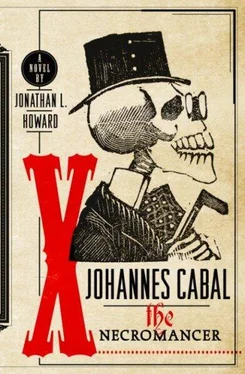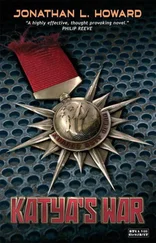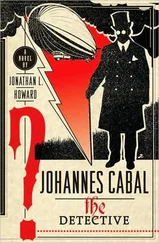Suddenly somebody was standing over him, a sad, grey man with thin, grey hair plastered to his skull and eyes like failed experiments in egg poaching. “Hello,” said the man. “Would you like some tea?”
Cabal sat up. He was most definitely no longer on the moor. Instead, he seemed to have landed in a garden — the sort of large, carefully designed garden that stately homes have resting in several acres. He couldn’t see any stately home, though. Just an expanse of slightly undisciplined lawn pocked with bushes and the rotting remains of summer-houses and gazebos. They were in the middle of a large shallow bowl of land that hid the true horizon, the false one itself being obscured by copses of trees that ran in a broad circle about him. Here and there, he could see people sitting in the little buildings or walking, slowly, between them. Nearby, three men and a woman played a very sedate game of croquet. Cabal knew enough about croquet to know that it is a game with undercurrents: calculating, ruthless, and with a cold-blooded desire to destroy the opposition. Not here, though. Here they were just puttering around, shunting balls through hoops. Very odd.
“Would you like a cup of tea?” asked the man again. Cabal looked at him and then at the bone-china cup and saucer he was proffering. The rain had filled the cup to the brim and made it overflow into the already flooded saucer. The only evidence of tea was a faint sepia tinge in the rainwater.
“No, thank you,” said Cabal. “I would like to know where I am, however.”
“Oh,” said the man. “Oh.” He had to think for a moment and then added, “Oh. You’re in the garden.”
“And where precisely is that?”
The man gestured with the teacup, spilling some. “Why, it’s here. Where we are.”
Cabal had a sinking feeling that he might have been abducted by Dadaists. He tried again. “No, I mean what’s beyond the garden?”
The man smiled gently, and Cabal had a sudden urge to punch him. “The garden,” said the man.
“More garden.”
“No. The garden.”
“How big is this garden?”
“It goes from the trees” — the man pointed in a random direction — “to the trees.” He pointed in the opposite direction.
“And what lies beyond the trees?”
“The garden.”
Cabal succumbed to his urge. He left the man sitting on the grass nursing his bloody nose and set off for the tree line. Nobody raised the slightest objection, nobody even seemed to notice. He walked in long, rangy strides — all the better to be out of this place of the dull — past a decaying bandstand, overgrown statuary, and the croquet players. He noticed in passing that one was crying. Great shuddering sobs made his shoulders quake with misery as he leaned on his mallet for support. The other players were apparently waiting for him to finish his breakdown and get on with the game. They watched him with long, grey faces without a flicker of animation, and Cabal realised that such incidents were common here. No matter. He had a carnival to get back to.
“Fun, fun, fun,” he said to himself as he climbed the shallow slope to the trees. When he had reached them, he stopped and looked back. It was slightly odd that there was no pond or lake in the middle of the depression. It must have remarkably good drainage. He shook his head and entered the trees. The copse was dense and dark, and great drops of water never stopped percolating their way down from the dismal sky. He actually seemed to be getting wetter as the stuff managed to get past his hat and scarf and inside his long coat. This couldn’t be doing his cold any good. Actually, his cold seemed to have vanished. He paused and wiggled his nose experimentally. There was no itch, no impending sneeze. This was odd, too: Cabal didn’t often get colds, but when he did, they stayed. He was starting to have a very bad feeling about his whole situation. He shoved his way through the trees with renewed vigour.
When he finally burst out into the open again, he was disappointed not to be surprised. There, before him, lay the garden, exactly as he’d seen it just before going into the trees. He sighed, found a new entry point into the copse, and tried again. He wasn’t optimistic; he knew his course might have deviated some way from a straight line while he was negotiating his way between the trunks, but there was no possibility that he’d performed a complete about-face without being aware of it. Still, he owed it to himself and the scientific method to try again. Several minutes later, he was again rewarded with a vista of grass, garden furniture, and very depressed people playing croquet the way it isn’t supposed to be played.
Of course, he’d heard of pocket universes, but he’d always imagined them as rather larger than this. More interesting, too. Rufus seemed to have spent his institutional time on something other than macramé potholders. It didn’t look like the sort of place he’d have created as a dump for his enemies; Rufus liked his tortures to involve spikes and straps. Some long-dead sorcerer or thaumaturgist might well have crafted this garden originally as a place for contemplation. Rufus then found it lurking somewhere between the planes and hijacked it. Yes, thought Cabal, that would seem to fit the facts. Well, there had to be a way out. Its original creator must have designed an exit of some description after all. Stifling his displeasure down to a downward cast of his mouth, he made his way back to the heart of the garden.
The man with the cup of tea was waiting. Not especially for Cabal, but just standing around with the cup and saucer in his hand. “You punched me,” he said without rancour.
“I broke your nose,” said Cabal in a tone of mild disbelief. The man’s nose was looking very unbroken. He tapped experimentally at it. Either the nose had healed itself at incredible speed, or the man was taking stoicism to extreme lengths.
“Oh. I suppose you did. I don’t think it was meant to be at that angle.”
“How quickly did it heal?”
“How quickly?” asked the man with wide-eyed incomprehension.
“How long?”
“My nose?”
“No,” said Cabal with an implausible impersonation of patience. “I can see how long your nose is. How long did it take your nose to heal?”
“How long?”
“Yes.”
“My nose?”
“Yes.”
The man placed his thumb beneath his nose, where it joined the upper lip, and the index finger upon the tip. He carefully preserved the distance between the fingertips as he showed it to Cabal. “About an inch.”
For the second time in a short while, Cabal felt he had no choice but to repeat an experiment. The man, cup, and saucer went flying in disparate directions. He lay on his back for a few moments, blinking. “You punched me again,” he said, bemused at such strange behaviour.
“Yes, I did,” said Cabal. He watched the freshly broken nose with interest as he fished his watch out of his pocket and made a mental note of the time.
The blood stopped flowing almost immediately, after a few seconds the ugly contusion that had started to form was already in abeyance, and then, astonishingly, the nose straightened itself with no external help at all until it snapped back in place with a slight pop . The whole process had taken — Cabal consulted his watch — no time. He shook the watch and checked it again. Its hands stayed defiantly still. His first thought was that he had forgotten to wind it, but, thinking back, he’d definitely done so earlier, back on the train, while he’d been waiting for Horst to make a move in their chess match. Then he wondered if water had got into it, but, no, it had been bone-dry when he’d produced it from his pocket, and he’d sheltered it in his hand while he watched the man’s nose repair itself. “Have you got the time?” he asked the man as he helped him back to his feet.
Читать дальше










